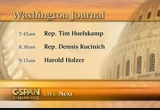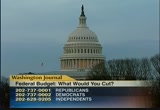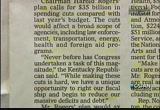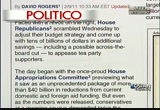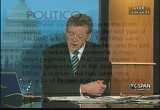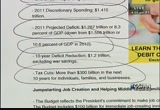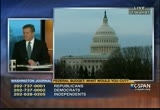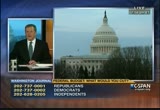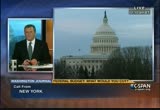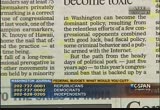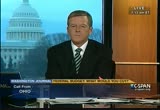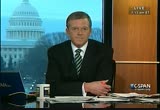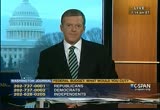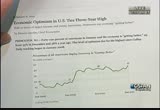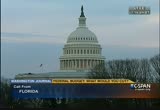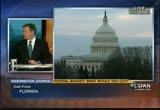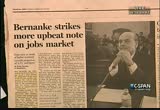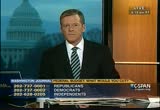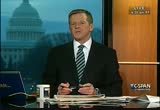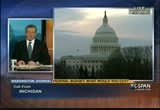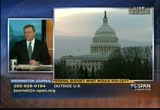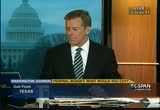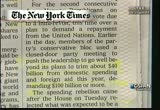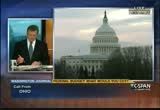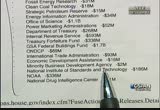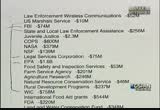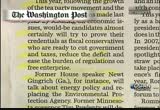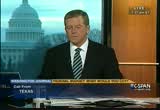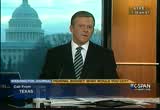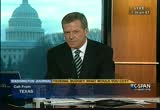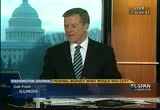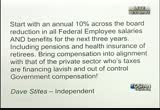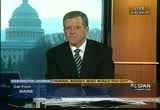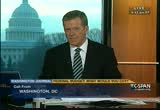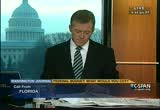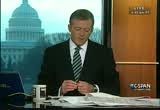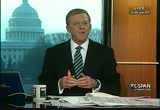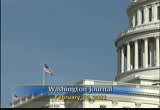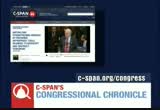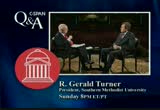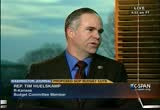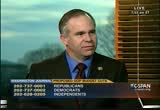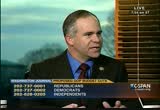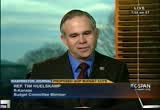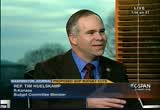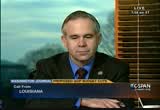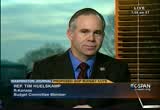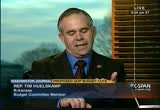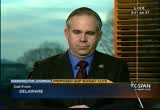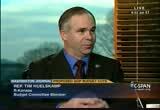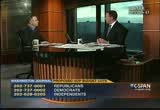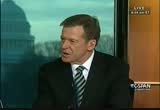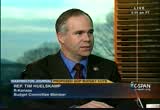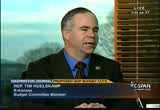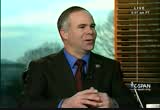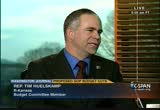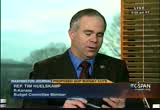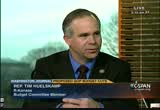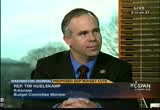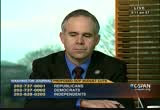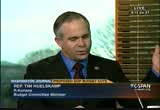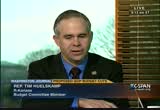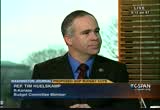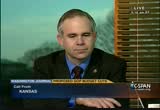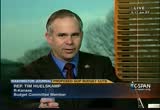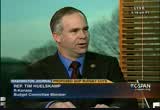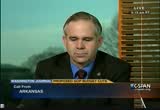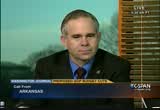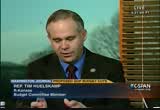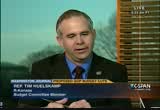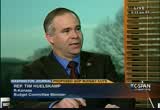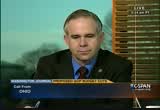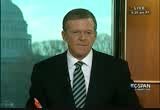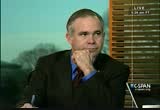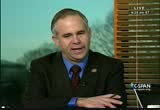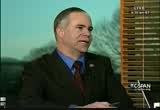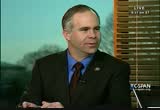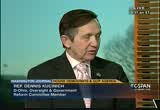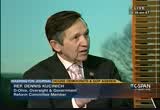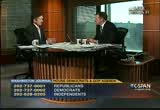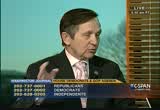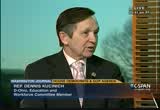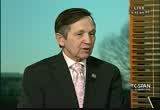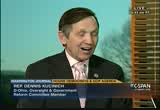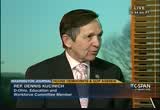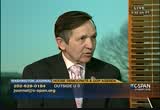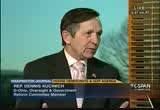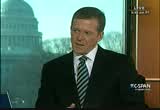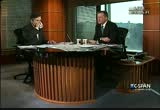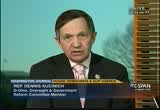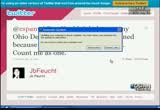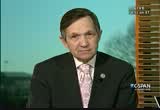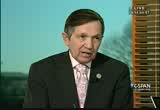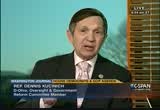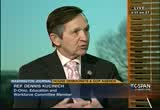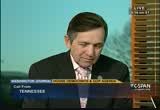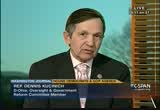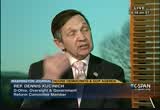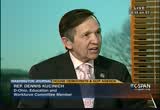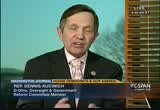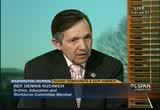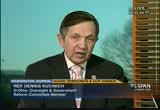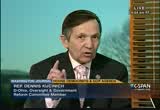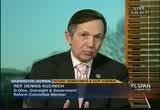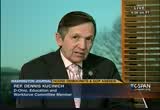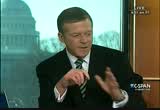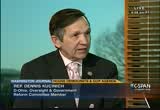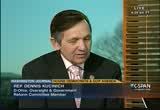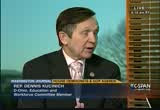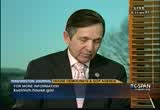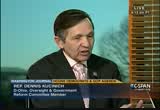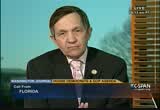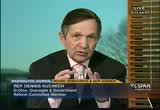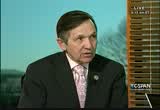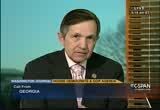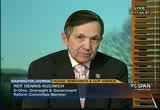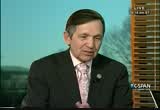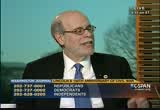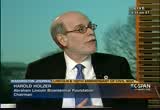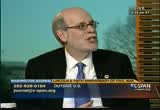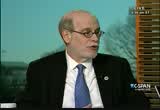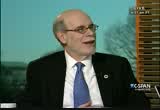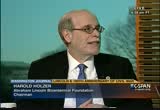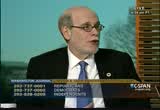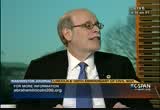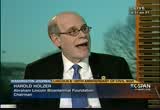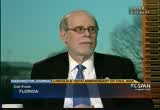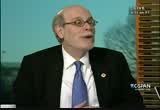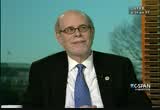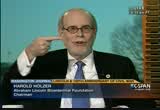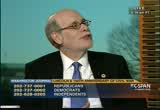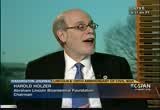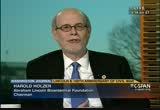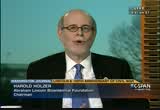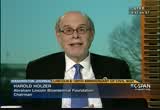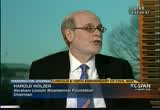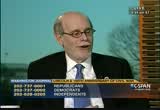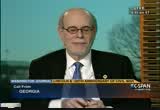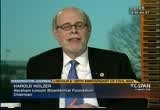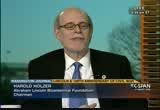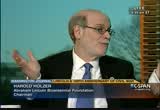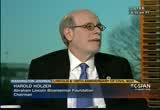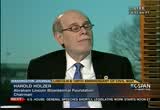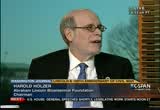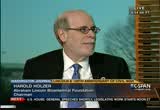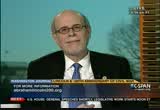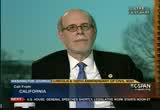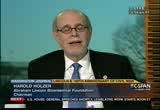tv Washington Journal CSPAN February 10, 2011 7:00am-10:00am EST
7:00 am
dennis kasich, a democrat. later in the show, historian on the link and the presidency and the 150th anniversary of the civil war. from the nation's capital, this is "washington journal." [captioning performed by national captioning institute] [captions copyright national cable satellite corp. 2011] host: good morning. it is federal budget season in washington. it said chair ben bernanke met the budget committee to discuss the economic outlook and the president's budget proposal. the appropriation committees are looking for ways to cut some federal spending. congressional vote on funding this year and increasing the debt ceiling will soon occur. tea party activists and
7:01 am
conservatives are calling for deeper cuts in spending. with all of this going on, it is your turn to weigh in. where and what if anything would you cut from the federal budget? you can see the phone numbers on the screen -- or tweet in what you would cut from the budget, if anything. we will begin taking your calls in a few minutes. a couple of articles related to federal spending and the budget. this is from "the washington times." the chairman of the house appropriations committee announced it beat federal spending cuts -- deep federal
7:04 am
7:05 am
overall, 2011 spending -- $3.80 trillion. 2011 discretionary spending, out of that 3.8, $1.40 trillion is the discretionary spending. 2011 projected deficit, $1.30 trillion or 8.3% of gdp. 10-year deficit reduction, $1.20 trillion. that is excluding war savings and tax cuts. $300 billion in the next 10 years for individuals, families, and businesses. a the budget season in washington. henry in new york city. a democrat, what would you cut? caller: thank you. i would cut funds from the 10- year billion dollar a week war that we have not paid for and we are paying for with all the domestic cuts that are hurting people.
7:06 am
my only question is, where is the humanity of it all. that is what i would cut. a billion dollar a week war. host: linda in orlando, republican line. caller: i wanted -- going to insert your question but i want to say, first of all, a lot of people criticize c-span but i think you all do a wonderful job. one thing that i wish you would do is when people calling in -- i wish you would try and encourage people to stay on the topic, first of all, and not just name call people. and congress because give examples. host: linda, thank you so much for the kind words. what would you cut from the federal budget and give an example? caller: this is what i was
7:07 am
encouraging you all to do. i would cut the federal spending for plant km. i know in the works -- planned parenthood. i know that it is in the works. it is not as large as anything like the defense budget and so forth, bu ti think it is an unnecessary and abused for of our federal spending and i hope they can eliminate that. host: michael, independent, spring lake, michigan. what from the federal budget if anything would you cut? caller: first, i just want to say i disagree cutting planned parenthood. a friend of mine it volunteered to be a -- volunteered to work, to talk women out of getting abortions. i think it is important. host: would would you cut? caller: first off, i would cut
7:08 am
elected officials pay and pensions. they have one of the best health plans that you can get and it is all taxpayer paid. you hear them talking about cutting all of the different programs that help people who need help but you never hear them talk about talking their own pay. host: the house a week or so back, or in january, cut their spending by 10%. caller: 10% -- what is that? they cut their spending but not their pay. host: democrat. cleveland, ohio. caller: are you talking to me? after cutting the money from the wars, i agree with the man who just spoke, i would cut their
7:09 am
health care completely until they took care of that business for the rest of the people. host: thank you for calling in this morning. from the appropriations committee, the committee on appropriations, their official press release on some of the items that they are proposing to be cut. and one of the items a couple of our viewers mentioned was planned parenthood. when it comes to family planning, they are proposing a cut of $327 million in family planning. bernie, republican, howard beach, new york. caller: i am 70 years old, got between my wife's pension and social security, bringing in about $40,000 a year. i am living ok. i would be willing to cut my social security in order to
7:10 am
reduce the deficit. social security. host: could we ask how much you get in social security? caller: 1400 and month. host:-the medicare cost? caller: i just realized, i get less now because i just switched to part b, so they are taking another $115 for my medical expenses. but i could cut 5% or 10% from my living expenses in order to accommodate reducing the deficit. i can do it. i am not going to be drinking anymore so does any more, considering the new report on diet soda, so there you go. all you have to do is make an effort. it is not impossible. host: thank you for calling in. front-page of "the washington times."
7:11 am
7:12 am
host: ohio. dick on the independent line. caller: first off, we should stop the wars, and that would save quite a bit of money. that would stop the war profiteering to halliburton and different companies. and we would stop the foreign aid -- we send all of that money over, trying to buy somebody. then we would stop the gentleman farmers repay millions of dollars to four not growing. then we would look at maybe some of the programs that hurts the poor and middle-class. but i think we need to start to talk and get rid of all of these programs. host: stay on the line. back to the budget figures. macro figures -- over all spending, $3.80 trillion. of that, $1.40 trillion is in
7:13 am
discretionary programs, non- medicare and non-social security programs. the deficit is $1.30 trillion for 2011. given those facts, we are talking the couple billion -- is there anything you think should be done to some of these non- discretionary spending which makes up the bulk of federal spending? caller: everybody can take a cut. no question. e are in this together. but i think these politicians, they should cut right away -- they should get on a medical program like everybody else has to see what living is like. host: new york city. gary on the democrats' line. caller: i would just like to say a couple of things. number one, if you zero out of the discretionary spending we would still have a deficit. number two, social security does
7:14 am
not affect the deficit. it is sound for the next 30 years. now, as for things that i would start cutting -- i would get rid of some of these military spending that we are doing, like that -- what is that thing? that extra engine -- for that new fighter. that stupid tank that doesn't float. there is so much in our deficit -- so much in our budget that is just pork and stupid things that trybody said, hey, let's this. to put this on the back of the people at the bottom -- to cut stuff like heating oil and assistance for people out of work and assistance for people who are just struggling right now, that makes no sense.
7:15 am
the people at the top have been getting over. instead of asking us to make the cut, how about they give up something? host: thank you for calling in did a couple of polls from gallup. economic optimism ties three- year high. this level of optimism ties for the highest since gallup daily tracking began in january of 2008. one more hole from gallup. obama's approval rating on deficit sinks to new low. president obama's approval rating for handling the federal budget deficit has gone from bad to worse in recent months, even as his rating on all other major national issues have generally held steady. currently 27% of americans approve of obama on the deficit, down from 32% in november,
7:16 am
while 68% disapprove. it on our republican line is fred in jacksonville, florida. caller: first of all, the first thing that should be cut is all foreign aid should be cut out. all police protection of the armies in germany, all those places, they should pay for their protection. we have been there longer enough. some of these bases should be shut down -- cut off. it is time for them to do their share. the other thing, the u.n. doesn't need to get another dollar and i am tired like the rest of the people -- and the united states is number one, they should be took care of first. and all of this money going abroad would be helping the people here in the united states. host: one of the issues the house is looking at is the defunding health care, getting rid of the health care plan that
7:17 am
passed last year but what is your view on that? caller: it should be got rid of right now. the only way this would work out for the american people is, like i said, cut all foreign aid and put the money into the health care in the united states, and then i would say it would be ok. but all this money going out to all these foreign countries, we end up having to buy them over and over and giving our equipment and they use the equipment on us. it's got to stop. i am a taxpayer of the united states and not of the world. it's got to end. i hope people are listening. host: this tweet -- ben bernanke met with the house budget committee yesterday. we covered that on c-span. you can watch at c-span.org whenever you want.
7:18 am
three headlines, very quickly, from ben bernanke's testimony yesterday. this is from -- my goodness -- "the washington post." is their headline. here is "the wall street journal" -- and from "the financial times" -- bernanke strikes more upbeat note on jobs market. you are on c-span. caller: i want to thank c-span for all of the work they are doing. i totally agree with the guy that called, you got to cut everything outside of this country before you touch anything for the citizens inside this country. that is a shame that we see all of this money flowing outside of the country, doing nothing for us. all this stuff going on. got friends in the military who
7:19 am
have lost their houses, their businesses. i did not know where these people are living -- saying the economy getting better -- because i do not see it. host: what do you think about non-discretionary spending cuts? caller: like i said -- it does not matter what it is. if it is inside this country -- just like if you've got a budget, you take care of everything that is not inside your house, you get rid of it first before you touch anything for your family. that just doesn't make any sense that you go cutting people's stuff inside of this country, programs and stock, before you cut everybody else off that are not even citizens. you know what i'm saying? it doesn't matter -- matter if it is discretionary or non- discretionary. host: thank you for calling in. linda tweets in -- next call from davidson,
7:20 am
michigan. caller: good morning. i think they should cut the federal and state and county city programs and terms of their pay and benefits and their pensions, which is a big in california. that is affecting california and bankrupting it and it would help everywhere in the united states. host: philadelphia, joe, republican line. what would you cut, if anything, from the federal budget? joe? oops, i am sorry, this is michigan, randy, democrat. caller: quite all right. good morning. hope everything is going fine. first of all, i would have to agree with one caller who called in. i am glad he mentioned it. social security has absolutely nothing to do with the deficit. it is pay as you go. you could cut that to death and
7:21 am
you would not help the deficit. some of the stuff i would cut, both wars and prescriptions d program and go back to like bush had its of the budget would look better to start with. then we could go along and let the little game that all these republicans love to play, now all of a sudden we were hurt me. we were hurting just as bad under bush but we did not have it on the budget so we could play games. another thing i would do is i would start cutting subsidies for oil, coal, gas exploration out west -- out west. we subsidize all their business. charging the going rate to run cattle on federal land. they enjoy all of our federal land and don't pay the actual going rate for running cattle on federal land for feeding them off of all of our land. i have to agree with some of the other callers.
7:22 am
you are cutting america first. this is just ridiculous by the republicans. there are lots of places you could cut. you could be honest. small business. i think a mom and pop at this book -- corner -- i did not think dasa is a small business or coal is small business, and it is and i don't think price waterhouse is small business, but it is. we need to be more intellectually honest. it would help a lot of the budget deficit. thank you, peter, for putting up with my talking and have a good day. host: a viewer tweets in -- if you think taxes should be raised, feel free to do so. bill, republican, michigan. good morning. caller: the first thing i would do is cut the department of energy. they produce no energy and they
7:23 am
stop us from producing. one thing i do not understand, we give out free meals at schools but yet we give out food stamps. is this ignorance or what? you got free food because we give you food stamps. pack the kid a linchpin in no way i should be paying for three meals -- packed the kid a lunch. no way i should be paying for free meals. host: barbara, what would you cut? caller: i just want to say, thank you foresees been. someone has already stolen my thunder. i like the idea of cutting all of the -- looking at all of the subsidies that we give to the oil companies, big corporations, and i also like the -- looking at some of the loopholes, too, because the big companies say they pay 35% when a lot of the people know the effective rate is 15% or 20%
7:24 am
less. i would also like to say something about going back to the 2008 budget. because i have been listening. a lot of our spending is on automatic pilot. it is left over from 2008 when we weren't actually just spending what was in our budget, we had the off-balance sheet spending which has now been brought into our budget. the's where a lot of problems started. anyway, that is my comments. host: another twitter follower -- now, the lead story in "the new york times" -- in several papers but "the new york times" chooses to lead with it. carl hulse writes --
7:26 am
this is, again, in "the new york times." we will talk about some of the issues with our two upcoming guests, two congressmen, the congressman from kansas and congressman dennis the senate from ohio. the next call comes from philadelphia. joe on our republican line. what do you think? caller: i agree with most of the previous callers -- i would cut just about all those things. but they are only scratching the surface. we needed to go through the entire budget, article one, section 8, there are only 17 things the government is allowed to do. anything the government is not allowed to do, you cut it. somebody figured out the budget would be about one seventh of what is right now. and money would be raised from tariffs alone. host: eugene in columbus, ohio,
7:27 am
on the independent line. caller: good morning to you. first off, foreign aid to all countries. homeland security. anything that funds the patriot act or the un-patriot act. dea. corporations and all of these other subsidies. these farmers. anything else, like the previous caller was talking about that is not under the constitution there. i hope these people hear me loud and clear. host: again, from the appropriations committee, here is a look at some of their proposed budget cuts that they want to make. this is the house appropriations committee. very quickly. flood control and coastal emergencies, 30 million, and efficiency and renewable energy, 899 million, and adjust the delivery and energy reliability, 49 million, nuclear energy, one under 69 million, due
7:28 am
7:29 am
presidents after they get out of office? why did they keep receiving their pay? and why does the house and congress receive insurance free when they tried to do away with our insurance? that's my pet peeve of this morning. thank you. host:gerald in st. augustine, florida, on the republican line. what would you cut from the federal budget, if anything? caller: we are in 50 countries around the world with our military. we should be protecting our friends and not our enemies. if we brought those people back, they could stand hand-in- hand and our borders and covered the united states, which is, under the constitution, the government job. number two, we have all the oil and gas we need in this country. we need to stop the largest flow
7:30 am
of money or wealth in the history of mankind to saudi arabia or other producers. no. 3, there is a constitution that we need to follow. we don't need the government sticking their noses in all of our business all over, business. every time we turn around, there is a government takeover of everything. host: you have probably seen this picture. this is now former congressman christopher lee, a second-term er, republican from new york. he has resigned. this is the picture he sent to somebody on craigslist. is is in all of the papers this morning. this is in the washington post. this is from janet napolitano's testimony yesterday. the terrorist threat to the united states may be at its
7:31 am
most-states and 9/11. that is in "the washington post." bill, a democrat from west virginia, good morning. caller: my pet peeve this morning was that we, as a country, we welcome everyone to come here and enjoy our american dream, but get there are certain people that come into this country that we actually -- yet there are certain people that come into this country that we actually pay to be here from
7:32 am
other countries. we have a large number of people who are unemployed. we need to employ the people of america first. we need to stop the programs of our government subsidizing people from other countries to actually be here in the united states. we do not need to have that. of course, i agree on these energy bills and our troops need to be coming back here that are not actually needed to protect our interests overseas. we need to have them here to protect our borders. yes, we need to get the people that we are paying to be here -- we need to take them out of here and use that money to employ the united states citizens. host: thank you for calling in from bridgeport, west virginia. from the house committee on appropriations, hear some more of the cuts they are proposing -- here are some more of the cuts they are proposing.
7:33 am
lee in cincinnati, ohio, on our independent line. what, if anything, would you cut from the federal budget? caller: i believe it would be the food stamps. host: why? caller: i know quite a few people on food stamps. when i talk to them or go over to their house, some of them are eating steak, crab legs.
7:34 am
they should be on a program where there are only certain food items you are allowed to buy. she's, milk, some cereals -- cheese, milk, some cereals. i do not believe you should be able to buy any luxury food item you want. host: a much coverage is speaker boehner getting? what you think about him? caller: i like him a lot. host: what kind of business the run -- do you run? caller: i run a small business roofing company. host: "the washington post."
7:35 am
7:36 am
7:37 am
defense budget should be exempt. the first thing i would take out of the budget -- i would ground 22's.b-22's and the cv- they do not perform as they are supposed to. they never have. second thing is -- one of your other callers talked about the second engine for the jets strike fighter. that needs to be thrown away. the first engine won in the competition in the first round. that is just strictly pork barrel. a third thing should be on the attacker program for the in- flight refueling. it is a matter of national security that that be produced here in the united states and not by airbus mysteries in europe. that competition should have already been awarded to boeing. host: james, why so much knowledge and interest in these military issues? caller: i have served in the military for a while as an
7:38 am
aviator, and i follow these programs very carefully. like i say, the tilt rotors just have not performed as they were designed to do. host: are you still in the military? caller: just retired. host: after how many years? caller: 20. as far as the social security thing, as a civilian, i pay a 6% payroll tax now. i pay that on 100% of my wages. but i noticed that some people are exempt from that requirement to pay 6% on 100% of their wages. it seems to me like everybody that's employed should pay 6% on the total of their wages. i pay it on 1%. r c.o.p. is it on less than 1/10 of 1% -- our ceo is paying less
7:39 am
than 1/10 of 1%. host: are you what they call a -- dipper -- a double-dipper? do you received a military pension and social -- receive a military pension and social security as well? caller: i am paying that tax. host: when you turn 65, will you receive both? caller: i would not be eligible for my full social security to the age of 67. host: are you happy with the health care that's provided? are you going to the veterans' health care system? caller: yes, i am. host: thank you for calling in this morning. audrey from marion, illinois is on our independent line.
7:40 am
good morning. caller: i would just like to say that a lot of our cuts -- they need to take about a 10% debt in their pay. i think that would help a whole bunch. i think that would probably cut it in half. another thing on the unemployment and everything -- they are not helping the people that's been out of work for a long time. they got up to 9% unemployment. that is not the story. a lot of people have run out of unemployment. they cannot get it. no job. what do they do? host: thank you for calling in. , sayingt writes insa --
7:41 am
7:42 am
is for cuts to the federal budget. cindy is a republican in bangor, maine. good morning. what would you cut? caller: i would cut the entire nasa space program. i agree with a lot of other callers. i would definitely cut a lot of the politicians' salaries, especially with regard to health care. we need to tax imports and start making things again. we sell our technologies to all of these countries, especially china. we have millions of factories, all of the technology and know- how. why don't we open our factories and begin to make things again, put americans back to work? host: why would you cut nasa? caller: we do not need to explore space right now. if we focus on taking care of our people and the planet we are on, we will not have to worry about going somewhere else. i am all for science.
7:43 am
i am a nursing student, about to graduate. i see people suffer every day. it is horrible. host: thank you for calling in. on our democrat line, absalom. caller: i want to start, first of all, with this premise raised by the article about cuts being raised in discretionary funds. i would first cut all capital expenditure products by the -- projects by the federal government, both military and domestic. that means the department of homeland security, the spending program -- the building program of over $3 billion for facilities needs to be cut completely. we need to cut the money that goes to the chamber of commerce, subsidies to the oil companies and farms. we need to close military bases overseas, starting first with germany and then south korea. host: thank you or calling in.
7:44 am
miami, diana, on our republican line. you are on the "washington journal." caller: we have to stay in afghanistan and pakistan because they have nuclear weapons. all we need is for al qaeda and taliban to get a viable nuclear- weapons and we are in serious trouble. secondly, the fathers do not pay for these children. thirdly, all federal programs that you list should be turned over to the states to determine if they, a, want them, and b, want to pay for them. we have to absolutely support the military. we have 32 bases on the former soviet union which will protect us in the future, because they are on the move, as well as is radical is long.
7:45 am
it is a big mistake to shut down are bases overseas. when we did not pay attention to what hitler was doing, millions of people died. either we pay now for the protection of this country and know what is going on overseas, or we will pay later. host: thank you. at 10:00 a.m. eastern time this morning, on c-span2, we will be live with the house select intelligence committee, talking about world wide threats. testifying at the committee will be james clapper, leon panetta, director of the cia, and other security leaders in our country. that will be at 10:00 a.m. on c- span2. by the way, mike rogers, chairman of the house intelligence committee, and congressman dutch ruppersberger, a democrat of maryland, the ranking member on
7:46 am
the house intelligence committee, will both be guests on "washington journal" tomorrow. you can see that. at 10:00 a.m. on c-span2. -- that hearing at 10:00 a.m. on c-span2. last night, we covered -- c-span and "booktv" covered secretary rums felt at his book tour event -- secretary rumsfeld at his book tour event. this was held up the constitution center in philadelphia. he was interviewed by a historian. it is about an hour and 15 minutes. if you want to see secretary rumsfeld talk about "known and unknown," go to booktv.org. you can click a button to watch
7:47 am
that. it will air this weekend on "booktv." silver spring, md., ricardo on our independent line. what, if anything, would you cut from the federal budget? caller: we are in trouble if we do. we are in trouble if we don't. we could go back into an even deeper recession, and maybe even depression. we are money from the federal reserve. then we have to pay that debt. the entire principle of our debt -- no money will be in circulation. where is the money to pay the interest? the system, right now, is fraud, as far as our monetary system or economy. we're trying to hold on to something that isn't working. host: all right.
7:48 am
coming up in about 45 minutes or so is congressman dennis kucinich, a democrat of ohio. we will continue our discussion on congressional issues with him. up next is a freshman republican congressman from kansas, tim fernholz camp. we will continue -- tim huelskamp. we will continue talking about the budget. we will be right back.
7:49 am
>> the patriot act, passed after the 9/11 attacks, made it easier to conduct surveillance on terrorism suspects. with the bill ending this month, lawmakers are trying to renew expiring provisions. the house failed to get across 2/3 needed to pass. follow the history of the bill online with cs and's congressional chronicle -- c- span's congressional chronicle. >> this weekend on american history tv on c-span3, voting discrimination in the south and the kennedy administration's strategy to overcome it. also, a look at the beliefs of our founding fathers and the role of christianity in establishing our nation. senator daniel inouye talks about his military service with the all-japanese american 42nd regimental combat team. experience american history tv on c-span3, all weekend, every
7:50 am
weekend. for complete schedule, go to c- span.org/history. you can click on the e-mail alert button to have them e- mailed to you. >> i think that is one of the challenges facing not only higher ed, but our country -- how do we maintain a healthy lifestyle and get kids to have the strength and judgment to say no? >> r. gerald turner is the president of seven months of this university -- southern methodist university. he will be on c-span's "q&a." >> "washington journal" continues. host: let me introduce you to congressman tim huelskamp, a republican from kansas, a freshman and member of the budget committee. congressman, welcome, for the first time, to the "washington
7:51 am
journal." am i saying your last name correctly? guest: that will work. host: how do you pronounce it? guest: exactly like you did. host: we were talking with our viewers about budget cuts to federal spending. you are a member of the budget committee. can you put into context what has been going on in the last couple of weeks in the budget committee, the appropriations committee, and, in a lot of news reports, about some conservative and tea party activists calling for more budget cuts? guest: status quo is clearly not an option. both parties have, for far too long, ignored the culture of over-spending. when you're looking of the $1.50 trillion deficit, it is mind- boggling. what we're trying to do is start the process of balancing the budget. it did not happen overnight, and it will take awhile. host: the appropriations committee is looking at about
7:52 am
$40 billion of cuts or so, some different figures out there. is that a good start? is that enough in your view? guest: absolutely not. we have a long ways to go. $40 billion out of $1.50 trillion -- we obviously cannot balance the budget this year, but we do need to start. i just had 14 town halls in my district last week. i said, everything is on the table. most americans are getting it. they are expecting a straight answer from washington. far too long, we have been told we could borrow, spend, tax, and it would all work out, and it is not. host: where would you like to see more cuts made? guest: i think everything should be on the table. we have to have significant entitlement reforms. that will be part of the discussion. there are plenty of programs, there is a list of cuts that actually make a difference. we have to do something about our $1.50 trillion.
7:53 am
host: that is the republican study committee chaired by jordan. how would you envision a time element -- and is an entitlement reform? guest: we need a new model. we need a model of medical provisions that involve more competition and choice, which to get into the whole provision of the president's health care plan and those kinds of things. but we do have a medical deficit. we do have an out-of-control federal budget because of our medical costs. as part of medicare and medicaid as well as social security -- that is part of medicare, medicaid, as well as social security. we do not have the option to ignore these problems. host: you had been bernanke up at the budget committee yesterday. what did you hear from him? guest: i was really underwhelmed. he wants to take credit for
7:54 am
economic growth, but we do not have growth. we're looking at long-term unemployment at high levels and talking about five years to 10 years, maybe, at the current growth rate that we would level -- wrote to the levels of unemployment we are used to and should have. we have, essentially, a jobless recovery going on. i was very underwhelmed. most republicans agree that jobs are created by people in the private sector. what we need to do in the washington, in my opinion, is to get out of the way. that is what my folks in kansas are looking for. host: this is your first time in washington. give us a quick background on yourself. guest: i come from a small town called fowler. served a few years in the state legislature. i got tired of what was going on in washington. i want to change the culture. , and not just at the margins. we are talking fundamental
7:55 am
change, a culture in washington that is out of control in every sector of the economy. with the $1.50 trillion deficit and any gnomic -- an anemic recovery, it is time for change. host: are you a member of the tea party caucus? guest: i am a member of the tea party caucus. i have served in the state legislature for a number of years. i often spoke at taxpayer rallies, as we called them then. what is amazing is the fact that, are around the world, you have folks protesting for more government. hear, more americans are saying, we want less -- here, americans are saying, we want less out of washington. it is a distinctly american idea that we need less in washington. we have a constitution that should be limiting what is going on. we are members. we are excited about the fact that millions of americans, i think, are involved, when, a couple of years ago, they
7:56 am
probably were not. host: this is in the washington times. house members facing turmoil in gop ranks. there have been a couple of votes where it has not gone the way that leadership wanted it to because of freshmen conservatives. guest: i do not know that it was freshman conservatives. we have been appear for a few weeks. -- up here for a few weeks. it is long term -- what are we going to get done? are we going to attack the budget deficit? a few votes here and there does not get it done. it is the real entitlement reform. it is the real budget-balancing. let's do a balanced-budget amendment. let's do things that have long term impact. we have a long way to go. the leadership is committed to that. they need to be moved in the
7:57 am
direction that most americans are witches -- are, which is, "let's get 'er done." the complacency about a $14.30 trillion debt, a $1.50 trillion deficit -- in my town halls, it is not about the folks that were there, but about the grandchildren and children today are the ones who will have to pay this off. i am concerned about the lack of complacency. a lot of folks say they want to do something. when i say, let's put everything on the table, they say, not my program, not what i am doing here. the complacency is my concern. host: first call for congressman tim huelskamp. byron, you are on the air. caller: thank you, peter, for letting me speak on c-span. i would like to ask the
7:58 am
congressman a couple of questions and give him some suggestions for balancing the budget. first fact that i know -- exactly 10 years ago this week, president george w. bush signed a $1.60 trillion tax cut. if he would not have done that, we would be $16 trillion and head right now. there would not have been any deficit. while he were a farmer or rancher, did you receive any subsidies from the federal government? let's cut out all the subsidies for the business, the oil companies, the farmers. let's also cut all foreign-aid and the cost of war. then we will have a surplus. host: thank you for calling in. let's start with the tax-cut issue. guest: a great question. i guess it is a different
7:59 am
philosophy. somehow, folks in washington think that if they take more of the taxpayers' money it will balance. we do not have a revenue problem. i believe we have a spending problem. you look at the facts and i think that is pretty clear. we need to make certain that entrepreneurs across america are willing to create -- able to create jobs, which involves providing certainty. if we could take more money, we could balance. government does take the money it needs. farm subsidies -- our family has taken those. my share of that has been very small. i have told my constituents that everything is on the table, including farm subsidies and food stamps. when you have over 30 million people receiving food stamps, the status quo is no longer an option. host: what you get when you say everything is on the table, including subsidies -- what do
8:00 am
you get when you say everything is on the table, including subsidies? is not the people voting a year from now that are going -- that i am worried about. i have young children. i'm worried about the $14.30 trillion. i think the american people are saying, hey, we understand -- currently, if you take out the money that comes in for the national debt, paying the interest and a mandatory programs, every other program, we borrow money to spend on it. that is not sustainable. host: next call, ted on our republican line. please go ahead with your question. caller: good morning. you show things on the tv, like a list of proposed cuts. $500 million here, $5 billion here, $1.2 billion here. the problem is, there is a
8:01 am
shortage. what we do not see is what the benefit of those programs are. to try and make cuts on pet peeves -- i hope the congressman and the budget committee will not be going by peeves, but will approach it or by what are the benefits we receive from -these receive- more by -- more by what are the benefits we receive from these things. it seems ludicrous to import 60% of the food in this country and continue to pay farmers not to grow food. that just doesn't make sense to me. what is a "forgiven loan"? that sounds like a gift with a five-year string on it. the most important thing i think we can do is invest in the education program. many of your listeners have called in, said, we have to start putting americans back to work. we cannot put americans back to work in factories and so forth because the jobs -- the labor
8:02 am
market just is not there for that. we have to have a worldwide market. an educated populace is the only way to do that. things are not working on that -- in that area. host: we have a lot going on. congressman? guest: i appreciate your comments. if education could drive our economy, we would have the fastest-growing economy in the world. we spent trillions of dollars on education. the president wants to invest, spend, borrow. it just does not grow the economy. what does grow the economy is taking on the regulations, the small business administration estimates that the cost of regulations are $1.75 trillion. if we could roll some of those back to a level of certainty and a level that is much lower than it was before the current and previous administrations, we would have much growth. we would have jobs.
8:03 am
if we could spend our way to prosperity -- they have proven in washington that isn't working. again, it is the old adage that washington does not create jobs, but more regulation and red tape. let's unleashed entrepreneurs across america -- unleash entrepreneurs across america and we will see tremendous growth. host: congressman tools camp is our guest -- huelskamp is our gest. what do you want to question douglas elmendorf about? guest: i want to hear about the facts. where are we at? i asked mr. bernanke yesterday, tell us about the current economic growth projections. how long before we get down to the right to unemployment level? five or 10 years is not good enough. the idea that we could have a
8:04 am
$1.50 trillion deficit and people talk about $40 billion in cuts, and that is a rounding error -- we need to be serious and face the problem head-on. mr. bernanke did indicate that the long-term economic indicator -- impact of these deficits will be stunning. we cannot grow our way out of the deficit. we have to reduce what we are doing. host: do you think there is the political will to make some of the structural changes you have described and that president obama talked about in the state of the union address? guest: i believe there is, but i'm very optimistic. i think that's what the election was about in part. people were upset about the direction of the country and recognized that we just cannot carry $14.30 -- $1.40 trillion deficits. people at home tell me, hey, congressman, if you're going to
8:05 am
raise the debt ceiling, tell me exactly what you are going to do to make sure we do not have to do this again. i think there is the political will. i tell some of my colleagues, many of whom participated in creating the problem is -- the republicans were given a second chance in this election cycle. they will not be given a third. the republicans and democrats, president -- i am hopeful. we will see what happens. a lot of people talk, but this is about action. host: james allen tweets in -- guest: i do take part in the system, like every other federal employee. obama care simply stopped a job- killing proposal that would cost $2.70 trillion.
8:06 am
somehow, there are folks in this town who believed they were controlling the entire of care system they would save us all money. i could not find a government program that has worked out that way, particularly on health care. if you look at medicare, it has not worked out that way. what we need is competition and more choice, just like federal employees have. they can buy from many different entities. we need more competition and choice. that is why we're going to work in committees in washington to provide alternatives. we will do what we can to add some real help for reform -- health care reform. host: tell us about this district. guest: it is huge and getting larger. it is the western 2/3, essentially. it is about 2/3 of the landmass
8:07 am
in kansas. the largest town is 50,000. there are other towns closer to hand. i am from a town of 500. it is small town, rural america, folks who say "we've had enough." some programs can have a good argument -- some programs to have a good argument for them. others do not. it is tremendous to go out to town halls, have 14 of those in the week. folks give us an earful. host: is it losing population? guest: it certainly is, like many rural areas. the proposal by the epa to ban one pesticide -- there is no basis for that in science.
8:08 am
it estimates that will cost 40,000 -- 14,000 jobs. if that were banned, we would roll back many of our conservation practices many decades. there is a proposal by the epa to limit dust. i live in western kansas. there is probably not any day we would not exceed those limits. people say, what is going on, the tools camp -- on, huelskamp? host: next call, carl on our independent line. caller: hello. gentlemen, i would like to know why, in september, 2010, there was a bill that would end subsidies to american businesses to move jobs to china. it was defeated, mainly along
8:09 am
party lines, by the republicans. i think that would be a good way to start with budget cuts. let's stop giving these subsidies. also, let's maybe do something about bringing, or at least keeping, jobs in america. guest: carl, i'm familiar with the bill. i was not around at that time thatthank good -- at that time, thank goodness. we will have the highest corporate tax rate in the world. if you want to see jobs shift overseas and continue along that path, there will be our real economic impact -- a real economic impact. we can compete by changing the tax structure. we do have disincentives to business, and that is a real concern of mine. i appreciate your concern.
8:10 am
host: one of the issues coming up -- raising the debt ceiling. what is your plan right now? guest: in just a month or so, i think it is important to note that the vote on the debt ceiling is a referendum on past spending. we will probably have to vote to do that. the question is, what is going to be in that package? the idea that we can just raise the debt ceiling is not an option. we have serious needs for budget reform. i would personally support a balanced-budget amendment, so we can avoid this problem in the future. balance your budget. it will take a couple of years, but i think the american people understand that we cannot carry $1 trillion deficit as far as the eye can see. i think we will see that in the president's budget next week. the idea that we would simply raise and go on is not an
8:11 am
option. host: indianapolis, kent, you're on our republican line. you are on with congressman huelskamp. caller: in watching the hearing with mr. bernanke, it seemed like he was operating congress, telling them what to do -- berating congress, telling them what to do. we should not be cutting the budget for bernanke. if we want to cut the budget, there is plenty of stuff to cut. the federal reserve caused the crisis. let the treasury print eurocurrency, as it stipulates in the constitution -- print their own currency, as it stipulates in the constitution. then, we need to go after more revenue. why don't we have a toga tax? why don't we take the bailout
8:12 am
money back from all of these international banks that are robbing us a blind? -- us blind? tim, if you let him do this, there are going to be serious problems. host: we have got the point. thank you. caller: in my book, mr. bernanke is an adviser. i think the real issue here is, when we are looking at the budget, we just cannot spend money we do not have. i appreciate you recognizing what washington does really does not grow the economy. we want to create jobs and washington does not do that. the stimulus and tarp have shown that -- this jobless recovery is a real concern. there are folks out there who think the new normal is 9% to 10% unemployment. that is the european model.
8:13 am
if washington would do less, get out of the way, and stop these high taxes, job-killing regulations, i think we would have economic growth, but it is not going to happen, i do not think, with policies at the fed. host: this is from bill, who tweets in -- is it a good thing, as a farmer/rancher, that corn prices are going up pretty significantly right now? how do you balance that with the increase in food costs? guest: it depends whether you have corn or not. it is a supply and demand function. ethanol has encouraged some of
8:14 am
the demand. frankly, we have some worldwide shortages of a number of commodities. in the current scenario, commodities are valued much more than paper. that came up at the hearing with mr. bernanke. he wants to remove a lot of the energy and food from the inflation measurements. that is where we have all the growth in inflation. i think there is a potential, real inflationary factor, but i don't want to get away from the issue of ethanol. it is almost market competitive. there are some folks in the ethanol industry that say, do away with subsidies, just make sure we have access. but, again, all of agriculture does not agree. those in the livestock sector are not necessarily supportive of ethanol subsidies. host: would you be supportive of
8:15 am
cutting ethanol subsidies? guest: they must be reduced. host: can they be eliminated? guest: i think they can. we will have hearings in the ag committee and in ways and means about that. how long can you subsidize an industry? there are folks in the industry that say, give us access to the marketplace to sell our product and we will be competitive with imported oil from the middle east. that is a good thing. we need to develop all of our domestic sources. i am in an area where we used to have the largest natural gas reserves in the world. we use coal. the epa has said they are concerned about that. it is kind of a local issue, but the public is that we are trying to produce new plants that would create new jobs. regulations have stopped that plant for the last three years.
8:16 am
host: mike is a democrat in the hayes, kansas. go ahead. caller: congressman, we would hope he would move a little bit more to the moderate approach as your predecessor -- you would move a little bit more to the moderate approach as your predecessor. the epa -- you have degraded in numerous occasions in your comments. actually, the epa could help in many ways to keep us safe, with clean water and clean air and some of the regulations that help to do that. as far as the budget cuts, how about considering what our former president eisenhower said about the military-industrial complex and all of the useless pieces of equipment? some of which the armed services do not even want, but congress continues to fund because it makes their districts look good.
8:17 am
washington can indeed create jobs, congressman. jobs in high-speed rail, solar, wind, which they can subsidize and had been subsidized in the past, to some extent. host: three issues on the table there, congressman. guest: i am serious, everything should be on the table. secretary gates has indicated some things he could do without, that he did not want all along. i think washington winces when you say, everything is on the table. they should all be competing. the idea is you set one sector off and say, we are not going to touch that. that means everybody wants not to be touched. what i disagree with is somehow washington creates jobs. the only jobs they have been creating -- that requirement
8:18 am
will create thousands of jobs, but it is not -- it will create thousands of jobs for accountants who do nothing economically. the epa is something i have talked about a lot. i am talking about the outcome mike, because -- about that a lot, mike, because kansans are tired of it. they talked about a cow tax. it is silly. we laugh about that at home, but it is still being talked about at the epa. they want to ban dust. it is silly things that are not scientific-based. that is my concern with the epa. the ban on that herbicide where there is no scientific basis. the global warming and cap and trade -- if you want to drive jobs out of rural america, cap and trade is a perfect way to
8:19 am
move those jobs to mexico. host: next call for the congressman. we have about 10 minutes left with our guest bank. -- guest. glen, we will put you on hold until you get the volume down. we will move to john in eureka springs, arkansas. caller: good morning. i have a couple of suggestions i would like to make. one, redo the tax code, close the loopholes for dirty energy. cut house pensions. closed 70% of the military bases around the world -- close 70% of the military bases around the world. these are from a closed political system. this is a problem. the term-limits -- two to three terms in the electoral college.
8:20 am
have a 50% vote. have real debates for president, not the canned ones we see. host: you put a lot on the table. i want to have you follow up. why do you support term limits? caller: what we keep seeing -- i keep listening to the tea party people. i was a little bit interested. what we see is the back and forth of the left and right and the media -- that is their business, to inflame the issues, and we never get to the core problem. we never talk about -- we have 870 military bases around the world. why? the republicans and these tea party people like to talk about the constitution and stuff. we are not living to the constitution. we're wasting so much money. you keep taking it from the
8:21 am
people who have no lobbyists. it is always from the weak, from the poor people. you elitists -- that is where i get with the term limits. these people have no sense of reality of what the real american people, the working class -- host: thank you for calling in. congressman? guest: that is what is great about america. we look at protests around the world. the vast majority of the people around the world do not get a chance to vote on their representatives. he talked about a lot of things. the first was the idea of tax code reform. i support a flatter, fairer tax. we will have hearings to start talking about that. the biggest issue in the campaign last year was the fact that we have an out-of-control deficit, $1.50 trillion, take whatever your figure is of the week. i think that is what the election was about. most americans miss the real
8:22 am
point, whether it is the military, food stamps. those things all need to be looked at. we are borrowing 40 cents out of every dollar we are spending. this somehow think if we would just or 41 cents -- borrow 41 cents, and we would grow the economy, that is not going to happen. we have gone far beyond the requirements of the constitution. host: about 20% of the congress is new this year. brand new congress. do you find that to be a good thing? do you think term limits are a good thing? do you think longevity is a good thing? guest: i am very happy with the freshman class. there is a broad array of various parts of america, various backgrounds and walks of life. we need that type of diversity
8:23 am
on capitol hill. i think is going to bring a new perspective. it really has. there is some real change. change is scary to a lot of folks in washington, especially those that are used to the status quo. hopefully, we will see whether we change washington or whether washington changes us. frankly, i did not sign a term- limit pledge for fear that i would have to serve the entire 12 years. i have to talk to young children. this is not a fun place to be. i think it is the right place to be, but the freshman, i think, are really committed -- the freshmen, i think, are really committed to staying in touch with the people back home. i think the damage that is done in terms of a trillion-dollar deposits -- may have added $2.8 trillion to our long-term deficit. it is amazing what could be done
8:24 am
in the next two years. host: how long does it take to get home and how do you do it? guest: it takes about 10 to 12 hours. it is a ways to get here. host: back to cincinnati and glenn on our republican line. caller: i have a couple of questions. one of the -- why don't we take some of the epa budget and do $25,000 tax credits for people to buy priuses and other hybrids? it cuts our oil usage in half. i get 42 mpg. that seems like a simple way to do it fast and also produce jobs. host: thank you.
8:25 am
guest: i appreciate the suggestion. i firmly believe if you want to buy the car, buy it. the government should not be telling you what to buy. the epa is standing in the way of a lot of new plants to produce electricity. if you want to buy electric cars, go ahead and do that, but i do not think the epa should be paying you to buy one. we have tremendous energy resources in this country, whether it is coal or ethanol. we have wind. we have tremendous resources, plus all of the oil and gas. if washington could get out of the way, we could produce a lot more energy. that will be a big driver in inflation. all of the above is the best approach. we're going to do that. host: nashville, clyde, independent line. go ahead. caller: yes, sir.
8:26 am
good morning. your guest was talking about cutting the education budget. he says he has four kids. are they in private school or public school? next, and -- he talks about regulations and cutting regulations. people were dying in the coal mines. i do not know how many are dying in china, etc. when nafta kicked in and all of the heavy industry started going south into mexico for, cheaper forthat -- for cheaper labor, that area became the hardest-hit in the world according to the world health organization for birth defects, because there was no epa, because there was rampant waste, pollution. host: clyde, we got the point.
8:27 am
congressman huelskamp? guest: there were quite a few things there. i am a firm believer that the bipartisan mistakes for no child eft behind -- let's turn education back over to the states. that is one way to reduce regulations. the new governor in kansas would be more than happy to take less money on the medicaid grant or education. give the money to the state and let them do what they can. the best interests are not found in washington usually appear they will be found back home. i think that is how we address a lot of the regulations. he is talking about regulations from 30 or 40 years ago. i am talking about regulations from the last couple of years, hundreds of regulations, particularly for health care. they will be enormous job-
8:28 am
killers and a drag on our economy. host: are you happy with the public school system in your area? with the town of 500, where do your kids go to school? guest: we home school our children. there are also virtual, online schools. about education -- i tell folks back home that it was a republican president who passed no time left behind -- no child left behind. the local board of education is so important. the further we separated from the local community, the greater the problem. host: what has been your experience with homeschooling? guest: it is tough. it really is. it is a real commitment. home schooling parents that i know are really committed to that. it is an option and a growing
8:29 am
option. i have seen some tremendous progress with a lot of children in home schooling. host: if you did not home school, is there a local school in your town of 500? guest: there is. it is one of the smallest schools in the entire state. that is always a challenge for rural areas, maintaining good schools. we have to have those. with the declining population, we always struggle with losing population, what i would like to do is to make sure washington is a partner by getting out of the way in this. that would create jobs. there are entrepreneurs all over the america that would -- all over the world that would like to be in america if there were reasonable levels of taxation. we have a great work ethic. we are trying to make sure certain employees want to stay there and come there. host: well you are out here, who is running your cattle rancher -- while you are out here, who
8:30 am
is running your cattle ranch? guest: no more cattle. just a few during the summer. mainly, it is a crop operation. my dad and brothers -- a typical west-kansas farming operation. we do not get much work done on the farm. the schedule does not permit that much. we have to turn that over to the rest of the family. is there a labor shortage if you need to hire folks to help out? guest: we have jobs. it is just whether people want to work in them. jobs include production. jobs in packing plants. we have jobs that need people. again, they're tough jobs in
8:31 am
agriculture. agriculture is a real bright spot in the economy. i think it is a robust spot in the future as well. host: mason city, iowa, robbed, republican line. hello, go ahead. no, he is not there. we will move on the to peoria, arizona. go ahead. caller: yes, thanks for taking my call. one of the things i would like to see -- host: we're listening, go ahead. caller: one of the things i would like to see congress addresses the amount of foreign aid. i understand -- host: all right, we got the point. just a reminder, turned down the volume. you'll be able to hear everything through your phone.
8:32 am
congressman, foreign aid. guest: i agree, there are a lot of reductions we have to do there, but it is a small drop in the bucket. the baucus of $1.50 trillion of drops. we have to focus on that. my staff found that recent $56 million, which is a big amount in the real world, but we spent foot -- sent $56 million last year to china, which does not make any sense. a major banker that is giving foreign aid, and that does not make sense at all. all of that will be discussed. hopefully we will reduce a lot of the foreign-aid. host: it is the 155 anniversary of kansas. guest: it was two weeks ago. kansas is in the middle in at the heart of things, the middle of the battle of slavery when we came into the union. we were known as bloody kansas. it was the battleground. >> it was after the election of 1860 but prior to the
8:33 am
inauguration of president lincoln. guest: yes, i was visiting my son must buy, reading him a book about thomas jefferson. and he said, when did we come into the union? i have four adopted children from african-american background. kansas led the forefront to free black americans and make sure that there were treated as citizens. tremendous history. 150 years of that in kansas. very proud of that. host: are they from haiti? guest: i have two others adopted from haiti. my two other children were already american. we have a mixture of international and domestic adoptions. host: congressman tim huelskamp, republican and of kansas, member of the two party caucus. we hope that you come back to the "washington journal." coming next, we will be talking to congressman dennis kucinich, democrat of ohio. after that, we will be looking at the 150th anniversary of the
8:34 am
civil war, which we are beginning at that time. april is the official start of the 150 the anniversary, the says christianson neal. but 150 years ago on this date, abraham lincoln was president- elect, about to get sworn in to office. and abraham lincoln historian and author harold holzer will be our guest in about 45 minutes to talk history with us. and next, dennis kucinich. >> and we're bringing you a news break from c-span radio. it is 8:34 in washington, d.c. criticism that intelligence services missed the sides of the arab revolt in tunisia and egypt, the nation's top intelligence official is expected to tell congress today that the threat from al qaeda and its affiliates remain his number-one priority. tomorrow, that will take place. director of national intelligence is also expected to defend have the intelligence
8:35 am
community tracked the revolt and slipped it through the two major american allies in the arab world. that is the house intelligence committee hearing the search light at 10:00 a.m. eastern time on c-span radio and on c-span2 television. in egypt, bus drivers and public transport workers in cairo have joined thousands of other state employees on strike today, and spreading labor unrest that has pumped further momentum into the latest wave of anti- government protests. an american security firms as hackers working from china have been breaking into the computers of oil companies in the united states as well as other countries. macafee says that since november 2009, hackers have been stealing sensitive information on operations, finances, and bidding for oil fields. finally, the firm realtytrac says that in january, the work
8:36 am
your homes for clothes on and there have been in more than three years. in florida, or the housing crisis has been especially acute, the foreclosure rate to drop 54% from the year before. those are some of the latest headlines on c-span radio. >> the page rick act passed after the 911 attacks made it easier to conduct surveillance on terrorism suspects. now provision of the bell ending this month, lawmakers are trying to renew the provisions. the house failed to get the two- thirds needed to pass that of all the history of the bill through today on line with c- span's congressional chronicle, or you can check the daily floor action in the house and senate with timelines and transcripts. fine video archives for every member at c-span.org/congress. the c-span networks, we provide coverage of politics, public affairs, nonfiction bucks, and american history. it is all available to you on television, radio, online, and
8:37 am
on social media networking sites. find our content any time to c- span video library. and we take c-span on the road with their digital bus, local content video, bringing resources to your community. washington your way, the c-span networks, now available in more than 100 million homes. created by cable, provided as a public service. >> "washington journal" continues. host: we would like to welcome back to the washington journal table congressman dennis kucinich, democrat of ohio. you have had a pretty good week politically this week, haven't you? >> always when i get to surf. host: we started with the patriot act vote. guest: the vote was put under suspension. i think you have a number of tea party republicans who are serious about standing up to the constitution. and i made the case over the
8:38 am
years, and i am not the only one, that the patriot act raises serious questions about violations of freedom of speech, a violation of the fourth amendment, and it was refreshing to see the kind of coalition that was put together. it may be just for that one bill, but it is a good sign, because that means that in washington, we're listening to people's plea that we get beyond partisanship and find ways of working together on matters that concern the american people. >host: we have been talking about the budgets and budget season could you have been through a couple of these didn't do you see anything new in the air with this budget season? guest: of course. there is a serious attempt to cut spending. we have to look at what the proposals are. cuts to nasa, that is like throwing away your seed corn. nasa helped to create the jobs
8:39 am
of the future. they are incubators of technology. you start to get nasa, you're basically telling all the scientists and technical geniuses who we employ, we do not need you, and we will get the jobs from where? china. cut to high-speed rail. we had this huge understanding in our society that we have a problem with consumption of energy. the whole idea about heist -- high-speed rail is it saves energy. it is an efficient way of getting around. there are cuts to women and infant care program, which basically takes care of poor children and their mothers. i mean, we have to start looking at where the cuts are. on the other hand, you cannot touch that sigrid california at the pentagon. they're going to keep getting bigger and bigger -- you cannot judge that sacred cow at the pentagon.
8:40 am
host: what about guest: entitlements if you mean cutting social security benefits, not a chance. privatizing social security, we want to put social security in the hands of wall street? are you kidding me? could you imagine what it would have been led a couple years ago of the american people had put their social security money in the market through legislation and then everything collapses and people lose everything they ever hoped to spend the rest of their lives on? i think keep wall street away from social security, make sure that people have the adequate health care in their senior years. i favor medicare for all, not just for those who are seniors. so no privatization of social security, no vouchers for medicare. the government does have a role in people's lives and to secure their retirement, which goes
8:41 am
back to the social security act and to have health care. it helps keep society together. host: why didn't cleveland get the democratic national convention? guest: i think it comes down to hotel rooms more than anything. but they could have made it happen. let's look at the politics of it. ohio was a tough place for democrats in 2010. republicans are very strong in ohio in 2010. they took all the constitutional offices in the state. they carried the u.s. senate seat. there was a turnover of five seats in the house. they took the state legislature. so it may be that the administration is looking towards north carolina as perhaps a place to plant the flag in the south, and knowing that ohio will be a tough call.
8:42 am
i hope they're not giving up on ohio. because i would not give up on ohio. if you have to look at the mistake that the al gore campaign made in 2000. they wrote off ohio. it could have made the difference in the outcome of the presidency in the year 2000. do not give up on ohio. host: this is a tweet we got double-are you running for president? guest: no, i intend to run for reelection in the house. there is a congressional redistricting. i know is going to lose two seats to the northern ohio has been with the epicenter of the population loss has occurred. i tell my supporters, let's get ready for election in 2012. let's get organize and raise funds, but i cannot tell you where the district will be. >> so you could be put out with redistricting. guest: i am aware of that.
8:43 am
i could stay in the congress. i could be put out because of redistricting. it could be dramatically changed, dismantled. whatever. i am not going to wait until the moment when somebody says here is the map, now what are we going to do? no, i am organizing now. i am getting ready for an inevitable series of events that will take place once a map is presented. that will mean that if i have to move, i will live forever my district is, but i do not know where the district is yet. >> when will we know what the districts are in ohio? guest: my guess is it will probably be toward the end of the year. there'll be redistricting. i think they're likely to come up with a map by the end of the year. i am not complaining about this process. it is a political reality. i will not just live with it, but i will look at it as an opportunity to continue to be of service somewhere.
8:44 am
i am hopeful i will be able to stay in cleveland. that is my home. that is were i have spent my life in service. but let's see how it works out. i do not get up in the morning worried about what might happen. i tried to spend my day making things happen. host: how is president obama doing? guest: i would like to see him more active in creating jobs. to me, it is about the economy. we have close to 50 million americans who are out of work and another more than 10 million americans who are underemployed. frankly, when the private sector does not create the jobs, the private sector famously has been responsible for the massive unemployment we have because the cut jobs and they stop those up. the private sector does not create the jobs from the government has a moral responsibility to get people back to work. we have enough work to do. we could rebuild america. we have trillions of dollars in capital needs that have not been met, that states cannot afford to pay for an cities cannot
8:45 am
afford to pay for. we could rebuild america. roads, bridges, water systems, sewer systems. but there is this dedication to reducing spending at a time when we need to spend. we need to prime the pump of the economy. so our economic policies, frankly, looking at it from the perspective of somebody from the midwest where there are massive job losses, our policies are upside-down. our trade policies are upside- down. we're not requiring businesses to invest money when they get big breaks. there are some real problems in this economy. and the obama administration has not done enough. >> do you think it will be healthy for the democratic party to have a primary for the president in 2012? guest: of course, i think primaries can have the opportunity of raising the issues in the democratic candidate a stronger candidate. i think it is safe to predict
8:46 am
that president obama will continue to be the nominee of the democratic party. but he can be a stronger nominee if he receives a strong challenge in the primary. host: if not you, then who? guest: that is not up to me to say. yes i focusing on being reelected to the house of representatives. i am very interested in making sure that creation of jobs, health care for all, protection of social security and medicare, that those things are fundamental. and education. so those are issues that certainly should be brought up in primaries. and finally, getting out of iraq and afghanistan. we have to stop roaming the world looking for dragons to slay. we have things to take care of right here at home. i hope that president obama starts focusing on our domestic economy and starts really -- maybe we need to take the keys of the economy away from wall street for a while. host: before we go to calls, congressman kucinich, you served on the oversight and government
8:47 am
reform committee, served as the ranking member on that committee. jim jordan, fellow ohioan and republican city committee chairman, is the chairman of that committee as well. i want to ask you about two things, your relationship with jimmy jordan, republican of ohio, and your relationship with your new governor, governor kasich. guest: first of all, i am the ranking member on the subcommittee that mr. jordan shares that deals with regulation and federal spending. i have always had a good relationship with jim jordan. he is solid. he is unaffected, unassuming, and just straight from the shoulder kind of guy. i also remember when he first came to congress and we sat in the committee together. i thought, maybe i should not tangle with this guy, he is a wrestling champion. he is a good man. we have serious differences politically.
8:48 am
one paper over. but the point about being in washington is that you should not base their friendships on whether or not you agree with some and ideologically. it is about the person. we have serious debates at the subcommittee level, but i am proud to be his friend. as far as governor kasich, i serve with then congressman kasich in the u.s. congress. he is very strong. he's very knowledgeable. and he has made some decisions early on that i would not have made, canceling our participation in high-speed rail. i think that is a problem. but it is his call. he is the governor, and i think that ohio has some real opportunities. the thing i would be advising him on, influence great jobs, protect lake erie, that water resources, and use of the about improving our public schools. host: have you had a meeting
8:49 am
with private manning yet? guest: no, but i have not heard gates.tefrom secretary whether private manning is guilty or innocent, separate issue. how he is treated well in confinement and while he is in the care and custody of the u.s. department of defense, that is a huge matter. if he does not have basic constitutional protections, specifically to be protected from cruel and unusual punishment while awaiting trial, that needs to be made a matter of public interest. so i am is seeking a meeting, a visit, with private manning to see if these reports about his a deteriorating mental condition have any validity and to make sure that our role as people involved in oversight in congress is safely fulfilled. host: first call is a democrat from ohio -- first call for the
8:50 am
democrat from ohio is from jim, republican from ohio. caller: how many representatives to we have in guest: ohio 18. caller: do they have offices in ohio and washington? guest: yes, every member of congress from ohio has an office here and at least one office in the home district. in my district, i have an office in lakewood, ohio and an office in parma, ohio. members have at least two, sometimes three or more offices. host: do you have a follow-up? caller: yes, it seems like a lot of offices and things and a lot of people. we have congress, the senate, we have a governor and stuff. why do we need so many government people? host: all right, thank you. congressman kucinich. guest: the government is organized at different levels. there is a local government which is closest to the people. i have served in the city
8:51 am
council and also as mayor of cleveland. that is the government which deals directly with providing services to people on a daily basis to the police, fire, emergency medical service, street repair. and you have your state government, which collects taxes and distributes them to hopefully keep schools going and medical and other services that are vital. keep the roads in repair. in some cases, states are recognized, so you have strong county governments which have a role in providing social services. and on the federal level, we come together as a collection of states to be able to, in the words of the preamble, provide for the common defense, promote the general welfare, secure the blessings of liberty for ourselves and our prosperity. they're different purposes for every level of government. host: this tweet has come in for you -- how many ohio democrats have their votes constrained because of gerrymandered districts?
8:52 am
count me as one. guest: if you're talking about voters or members of congress -- host: he is talking about voters, ohio democrats. guest: gerrymandering is the fact, and what it essentially means is that you can draw a district in order to strengthen a person's standing. all republicans in one district, all democrats in another. or a large number of republicans in one indy car about a few democrats in kind of dilute the effectiveness of the democrats might be joined to another district where there might be more democrats. in some cases, there can be evolution of the effectiveness of one party or another. that is the nature of gerrymandering, frankly, and it always has been and always will be. it is not fair, but it is the way the system is set up. host: doors, a democrat from schenectady, new york. caller: i am pleased to be able
8:53 am
to listen to represent a kucinich, because he was the one i would have liked to voted for for president. he did not get a fair break from the media when he was running, and it was not fair. the debates are always held with people who had the most money and had the most visual appeal. where kucinich was telling the truth, and he wanted the fairness doctrine, and he deserved the fairness doctrine. i run an organization called rid, and for the past 32 years, we have brought down -- what is happening now, every person 16 years old has seen 50,000 advertisements to drink on every possible occasion. that is called the culture. representative kucinich is willing to address the culture. he is a very courageous man. guest: i certainly appreciate you calling.
8:54 am
you're talking about schenectady, and i am wright, there was a strong presence there over the years. i think of the schenectady in towns like it across the country who lost jobs. this morning before i came on the air, i was looking at the trade deficit, and it is about $380 billion for the last year that it was recorded. and we are seeing that it has increased in december of last year over the previous november by about $1 billion for a month. the problem is that our jobs are just going overseas. places like schenectady, cleveland, toledo, detroit, places that helped make america great, we're losing our jobs. these trade agreements do not have workers' rights, human rights, environmental quality principles. china is taking all these jobs. no rules there. people say, let's get regulations here. but that makes it easier to
8:55 am
drive down wages, makes it easier to send more jobs to china. we have to impose regulations in our trade agreements and protect our jobs here. but i appreciate the woman calling. thank you for your kind remarks. when you mention your town, i think of towns like it and what we need to do to get our economy moving again. thank you. host: do you think there's a chance that the presidential debate system will change? guest: look, the networks have tremendous abilities to said the participants. the call from schenectady mention the fcc. the federal communications act of 1934 mandated that a broadcast licensees serving the public interest, convenience, and necessity. not everyone is c-span. some networks are connected to financial interests, whose interests may be otherwise if they hear certain things on the air. that is a problem i know, as
8:56 am
someone who was excluded from the debates, i know what happens. you get excluded from the debates and you cannot get your message out. so yeah, there's a tremendous amount of influence which tv networks have. there should be some kind of a nonpartisan system set up to determine the qualifications for people to be in the debate. it should not be arbitrary or capricious, and that unfortunately is what happens sometimes. host: knoxville, tennessee, independent line. go ahead. caller: good morning, representative kucinich. i was for you when you ran for president until it became obvious that the so-called free press showed that it was not quite free. three things i would like to reference and talk about a first of all, health care and your stance on universal health care. i am in a state right now work
8:57 am
the incoming governor is threatening to gut the medicaid program here in the state of tennessee. and then the affordable care acted house states present it down. also, this investment in america, you made several references about high-speed rail and things of that nature, but also energy policy and how that might relate. what are we going to do about the loss of our manufacturing base? what hope do we have? guest: we covered a lot of territory there. with respect to health care, there is a reason why 50 million americans do not have health care. they cannot afford it. you know, even if the government provided some subsidy, they will still have trouble affording it. why is health care so expensive?
8:58 am
one of the reasons is because insurance companies make money not providing health care. they put charges in that they attribute to health care but there for corporate profits, stock options, advertising, marketing, all of that not really related to health care, but they put great amounts of expense in it that way and drive the cost of health care of substantially. i of seen studies that say $1 out of every $3 goes to things that are not related directly to health care. so what i favor is a single page not profit system where everyone is covered, just like in all the european democracies. people having basehealth care ia basic right. insurance abuse are going to make more profits because it is not getting cheaper. i think it would be great at some point as we get into this
8:59 am
and this debate over health care to spend more time looking at the benefits of single payer. inevitably, states, like vermont, pennsylvania, and others, are going to turn to a single payer as a solution to the inability of the federal system to be able to deliver for everyone who is not on medicare. i want to comment on manufacturing. our trade laws, naphtha, the general agreement on tariffs and trade, a trade, have all contributed to an acceleration of jobs out of this country. what is it about? it is about cheap labor, one of the oldest stories in human history. you look at the effort to drive down the cost of labor, which actually suppresses everyone else's wages, and our jobs to move out of the country, and now, even the jobs that we're working in creating for the future, they're going out, too. when i first came to congress, we head china trade beginning to percolate as a discussion. one of the first industries in my office came from the aircraft
9:00 am
industry at boeing. there were trying to encourage me to go along with china trade, and it turns out that their place of entry into the chinese market was to get the prototypes to the new aircraft manufacturing to china. so here we are, the pillars of our economy, steel, automotive, aerospace, all in trouble because of these trade agreements. what i think should be done really, get out of naphtha, renegotiate all these trade agreements, stop china trade. china right now has close to a $280 billion trade surplus with the united states. and jobs are going there. workers do not have any rights. they cannot say anything. there are no prohibitions against child labor, slave labor, prison labor. and there's no protection to the environment. if anyone does not like environmental regulations, the move the job to china. many say we're losing our jobs,
9:01 am
so let's have regulations in china. so they cannot move jobs. and we protect our air here. otherwise, it is a race to the bottom, which is what these free-trade agreements have been about. host: what is the unemployment rate in your district, and what is still made there? guest: welcome we still have a presence in its steel and automotive and aerospace. we're still part of america's backbone, but is diminished. the unemployment rate across the country is between 9% and 10%. that is actually understated. people are giving up looking at jobs. my guess is in my district is probably over 15%. because the with the figures are calculated, it goes way beyond a congressional district. but there are many people who have trained to work and cannot get work. they receive college educations so they can get a good job. they cannot find a job.
9:02 am
they worked a lifetime and have been shoved out at age 55. this country is failing in this area. we have so many people whose lives -- people desire to be productive and they are not able to participate. so our economy lags. we wonder why we have such big trade deficits. instead, we keep building more and more military presence in the world. why don't we take care of things at home and rebuild the economy? why don't we make sure that every and person has the opportunity to go to college, that every person has health care? then we can also focus on creating wealth. at the wealth is a good thing. we should show people how wealth is created and enable the wealth to be borne equitably distributed throughout society. host: next call, st. joseph, louisiana, steve, republican. caller: thank you for taking my call. i was wanting to encourage the
9:03 am
congressman and all of our senators to provide as their plan for how we will achieve a balanced budget in this conjurecountry. not just general concepts, but indeed to else, something that you put on your website so each of us could look at your vision for achieving a fiscally sound country. and thank you for the opportunity. guest: i appreciate you calling. we all want our country to be fiscally stable. i would maintain that one of the reasons why the budget is out of balance right now is because we have not paid enough attention to job creation, where people can create and could pay money into taxes that help keep the economy going. but there are other reasons, too. for example, one of the reasons the budget is out of white, there is a zero restraint on
9:04 am
pentagon spending. very little ability to be able to track it. it was a day before 9/11, september 10, 2001, that then secretary rumsfeld was confronted with the fact that there were $2.3 trillion in expenses that he cannot keep track of at the pentagon. over 1100 different county systems. joseph stiglitz had a recently published book book that relates to the cost of the war in iraq is going to exceed $3 trillion over a certain time span. the war in afghanistan will go over half a billion in headwords $1 trillion. we get into these wars. there is an expense. then we talk about nation- building. why don't we start rebuilding america instead of talking about telling other people how they should run their lives in their countries?
9:05 am
so to the gentleman from louisiana, the cost of an expanded military, the cost of war is a huge factor driving our deficits. in addition to that, our trade agreements help drive our deficits. it is not education that has put this country into trouble. it is not providing for the health of our people, although there are ways to save money in health care. i have answered that. it is not social security that has put america into trouble. it is the fact that wall street was left to run rampant. they cheated their stockholders, and they cheated this country, and now they want to get rid of the regulations, whatever regulation existed, to impose restraint on them. we have got to find a way to be productive as a nation, to be self-sufficient as a nation, to create jobs for americans, to protect our jobs here at home,
9:06 am
and to stop running around the world looking for enemies to slay. host: here is a tweet -- guest: absolutely. i work with ron paul. we agree that the federal reserve has been beyond reach, beyond accountability. the about this, if you have the ability to basically print your own money, were with the restraint be? the federal reserve has a practice known as quantitative easing, but you have to translate that. what does that mean? in means you print money, you create money out of nothing. what to do they do with the money they create out of nothing? they put it into the economy and give it to banks. and who is the federal reserve? essentially, we are, because it is the full faith and credit that the u.s. government has to stand behind with what the federal reserve does. in 1913, our monetary system was
9:07 am
essentially privatized. now people would say, you know, it is up to the private sector to make those decisions. well, guess what? the constitution and the united states, which i have in the pocket of my winter coat out in the lobby, the constitution of the united states puts in the hands of the congress, article one section a, the ability to coin money. so the money powers are destined in government. we give it to the private sector. it goes to the private sector. not to create jobs, but to help the wealth of the country. . ron paul and i agree that the federal reserve has to change. if i think the federal reserve should be put under control of treasury. so it will not be a force unto itself. because right now, it is not functioning for all the american people. it is functioning for a few at the expense of the many. host: given your relationship with ron paul, could you see supporting him in 2012 for president?
9:08 am
guest: i like ron paul. he and i may not agree on some domestic issues. but on international policy, on the fact we are in alignment. i said that during the 2008 campaign. there were people who had the figures, oh, my god, you're talking about ron paul gillison, ron paul is a good american. he is solid and courageous. he is not afraid to stand up and speak out. he is someone who i appreciate. we may not agree on everything, but i will tell you one thing, i respect him, and if he is a candidate, i will always wish him well. host: he has written several books and has anyone coming out. what about you as an author? guest: i wrote a book called "courage to survive" that was published in 2007. i have been working on a book over a long time span about my experience when i was mayor of cleveland, where as a young mayor the largest bank in
9:09 am
cleveland tried to force me to sell my city's municipal electric system to a private utility in which the bank had with business witconnections it is an interesting story because cleveland was one of the few cities that was ever thrown into the fall over a political issue. i, of course, said no, i refused to sell. the city was put into default. the good news is that cleveland still has its municipal electric system. a few years ago it celebrated its 100th anniversary. it provides power to about a third of the city. over the history of the system, it has provided electricity that was cheaper. the idea was to give people a choice, provide competition. there are over two thousand municipally owned electric systems in the united states still. to the best of my knowledge, i have not checked that number lately, but that is something
9:10 am
that i believe it is still a real factor in the lives of communities across america. host: when will we see that book? guest: it is a work in progress. i have a number of different writing projects going. my daily life and i am in congress, i immerse myself in what is happening in the moment. whether it is the patriot act, act upon that. or issues trying to end war, active on the back. i do that, and when i have time, i work on my writing projects. i will let you know. it will agree to talk about it when we get to that. host: here is a tweet from michael -- guest: well, the obama administration has been a very heavy on advisers connected to wall street. now that may be smart politics,
9:11 am
because i suppose no one really wants wall street to come after them. but right at the beginning of his campaign for the presidency, president obama made it very clear that he was going to be an ally of wall street. to me, that is fine. if wall street is producing for the people of america. but what has happened is the finance economy has become a law unto itself, and it has existed only for itself. it does not really exist for creating jobs in this country. i have a problem with that. i wish president obama had a problem with that, too. it is bad enough just to go and give -- it is not enough to just go give lectures to groups and businesses and say that you should create jobs. well, you know what? they are not doing it. you have to set preconditions for any kind of help. if you do not create jobs, you do not get help. it is one of the currents that i had way back when.
9:12 am
this issue of the government bailing out wall street, and i voted against the bailout. and i said, look, why don't you have loan modification, have people save their homes? the administration would not do that. that is what secretary geithner said. he told a democratic conference that millions of people are going to lose their homes, as if that is just the way life goes. no, it is not. the banks and insurance companies ran a game that heard the american people. neighborhoods in cleveland have just been decimated. i think that the administration is much too close to wall street and has lost its connection to main street in many ways. it is not follow that anybody is going to be any better that comes forward. that is essentially what an election is all about. but do not expect me, just because i am not running, to stir the administration any kind of criticism when i feel is due. and on the economy, i can tell
9:13 am
you, come to cleveland, come to ohio, look at how people are fighting to survive. look at how people are desperate to hold on to their homes. and then they hear from washington, well, you know, maybe we will make some adjustments in social security, medicare -- no, no, no. i did it is a born for the obama administration to be challenged, but at least as a member of congress, i will continue to do that. host: i want to get these calls in. tampa, florida, a democrat. caller: good morning. you're one of the best congressman. help me with this thought process here. it seems to me when you talk, it is such common sense. and i asked myself, how come people are not getting it? i mean, it is just common sense. a 5-year-old, a 10-year-old
9:14 am
could get most of this stuff. it is not getting through. who is stopping it? it has to be the people who have an interest against these common-sense approaches. and the interest groups have to be these corporations are these people that are making money that are being affected by these common-sense approaches. guest: you know, i often wonder -- thank you for calling. i often wonder why it is that common sense does not seem to work in washington. our government is essentially been turned into a machine that takes all the wealth that takes all the people of america, accelerate to the top. the tax system is like that. there tens of millions of
9:15 am
people. the profits in the end it -- energy industry are extraordinary. our monetary system, banking, is set up that way. our economic system has some fundamental flaws in it which relate -- which inevitably create circumstances or the middle class is having trouble surviving. so the american dream is that you can have a home, be able to send your children to college, have some retirement security. that dream is getting the story right now, and it is all because -- the way i see it, the mechanisms of government are set up to take the wealth of america and put it into the hands of the few. i stand for jobs for all, health care for all, education for all, and peace. i think that is doable. i do not think it is impractical. i grew up in the city of cleveland, oldest of seven.
9:16 am
my parents never owned a home. we rented. we kept moving as the family group. i lived in 21 places by the time was 17, including a couple cars. many have heard this story, but i mention it again because i do not come from a background or i am out of touch with what people have to go through. and i see, having been in government and being in washington now for seven terms in my eighth term as a member of congress, the whole place is about taking the wealth of the nation in giving it to the few. that is what health care is about. $1 out of every $3 goes to the for-profit system. wall street would love to get its hands of social security. look, it is a constant battle to try to protect the interests, the broad based economic interest of the american people. a very difficult thing to do every day. host: final call for congressman kucinich. independent line. caller: good morning. as i am sure you already know,
9:17 am
mr. bernanke stated yesterday "energy prices have only risen 1%." yet, georgia power notified me last month that my monthly bill would increase 13%, effective immediately. how does congress reconcile mr. bernanke's inaccurate or false statement? guest: maybe he meant to say it has risen only 1% for him. look, you're a gentle lady from rahm, georgia points out something that all americans are aware of. the cost of utility rates are going up dramatically, whether you heat with oil, gas, or electric, you're paying more. the costs of gas, fuel, is going out and keeps going up. people are experiencing shock increases in the cost of living. mr. bernanke, and i thank him
9:18 am
for his service to the fed, but the fact of the matter is, he does not have to live with the reality that most americans have to live with. if he had any understanding of the fact that people are desperate to hold on to their jobs, have a decent wage, to have health care, make sure they have retirement security, make sure they can send their children to school -- these are practical aspirations. at the fed was really in touch with that, the policies would be different but they're not supposed to be in touch about. they are about biggy sure that the economy works. they do that well, but that did not really fulfil an obligation to the general public. that is not their charge. they are about managing the affairs of the monetary system for the benefit of the few in the expense of the many. and that is a fact host: congressman dennis kucinich has been our guest. as always, we appreciate you coming here talking with our callers. guest: it went fast. thank you. and i want to thank everyone who called in.
9:19 am
maybe we will get a chance to do it again. host: next, harold holzer, abraham witkin scholar and author, to talk about the 150th anniversary of the civil war and abraham lincoln's birth the. but first, this news update from c-span radio. >> your headlines. the number of people applying for unemployment benefits plunged last week to the lowest level in nearly three years, boosting hopes the companies will step up hiring this year as the economy strengthens. applications dropped by a seasonally adjusted 36,000 to 383,000. that is the lowest since early july 2008. jobless applications reflect a level of layoffs but can also indicate whether companies are willing to hire. egypt state television is reporting that the state prosecutor has launched a formal corruption investigation against three former government ministers and a former ruling party leader. that investigation is targeting
9:20 am
the former ministers of commerce, tourism, and housing. the former ruling party leader is a close friend of president mubarak's son. india and pakistan announced today that they will resume at wide-ranging peace talks that were frozen after the 2008 terrorist attacks in the indian city of mumbai. that is blamed on pakistan-based militants. the u.s. has been pressing the nuclear-arms longtime rivals to restart their peace efforts, in hopes that reducing tensions along their border would free pakistan to focus on its fight against taliban militants, a key element of u.s. strategy in afghanistan. finally, a proposal by a mississippi confederate veterans groups to sponsor a series of specialty state license plates to mark the 150th anniversary of what it calls the war between the states is quite controversial. one plate what honor confederate general nathan
9:21 am
bedford forrest, an early leader of the ku klux klan. we will talk about the anniversary of the civil war and the abraham lincoln presidency coming up on the "washington journal." those are the latest headlines on c-span radio. >> the patriot act made it easier to conduct surveillance on terrorism suspects, now with provisions of the bell ending this month, lawmakers are trying to renew aspiring provisions bit of the house for doing that this week but failed to get the two- thirds needed to pass it of all the history of the bill through today online at c-span's congressional chronicle, where you contracted daily floor action in the house and senate with timelines and transcripts. on the full video archive for every member at c-span.org/ congress. the c-span networks provide coverage of politics, public affairs, nonfiction books, and american history. it is all available to you on television, radio, online, and on social media networking sites.
9:22 am
and find our content any time through c-span video library. and we take c-span on the road with our digital bus and local content vehicle, bringing our resources to your community. it is washington your way, the c-span networks, now available in more than 100 million homes. created by cable, provided as a public service. >> "washington journal" continues. host: we're pleased to welcome to the c-span table harold holzer, the chairman of the abraham lincoln bicentennial foundation. he is also one of the nation's preeminent abraham against scholars and authors. he is here to talk about the 150th anniversary of the civil war, abraham lincoln's birthday coming up. we're going to talk about history. if you're interested, this is a good chance for you to call in and talk with an abraham lincoln scholar. it is the pureed 10, 2011. what was happening in this country 150 years ago today.
9:23 am
guest: well, it was the most tense transition in the history of the country. in those days, transitions lasted not until january 20. abraham lincoln was elected president and was back in springfield, illinois, keeping silent. host: as president-elect. guest: pursuing masterly inactivity. in a void of his silence, a peace convention is going full- blown here in washington. the national peace convention, sort of a route out of delegates from 21 states, getting together to save the country because they do not think abraham winnenden is equipped to do it and they do not think the country will survive until march 4. on this very day, they are arguing about amendments and the minutes of amendments, and they're fighting like mad over at the willard hotel. and abraham lincoln is packing.
9:24 am
he is leaving on february 11, leaving the next morning for washington. still has not been elected by the electoral college. still concerned about general scott was making sure nobody disrupted the counting of the electoral vote. so it is still up in the year. as your previous guest, congressman kucinich knows, he was heading toward cleveland when he got the word that he had been elected. host: how uncertain was the electoral college count at that point? guest: you know, it was probably a missed opportunity for the southern delegates who were still there and not to dress and the to disrupted. tuesday, we want a quorum and where is mississippi and south carolina? where is arkansas? we cannot have an electoral college. do not count these votes, but those states since in their votes. it was weird. so lincoln went over to his law
9:25 am
office in springfield and wind up to see his partner just to clean up some lingering cases. he had not been paying attention to the law practice for months. as he goes downstairs for what would be the final time, he sees the lincoln and herndon sign on its hinges moving in the breeze. and he said, let that sign hanging hear undisturbed because eventually i will come back and we will practice law again together. those were the last words as president-elect he spoke to his partner. he walked down the street and began packing for the trip. jefferson davis today, february 10, to be his counterpart as president of a divided country, was supposedly proving rosebushes when a horse galloped up to his garden and the writer handed him a note. his wife remembered his face.
9:26 am
there was news that he had been elected confederate states president. the two presidents of one country getting their act together for their inaugural journeys. host: who sponsored this peace convention that was happening in washington 150 years ago? guest: the original one. it was sort of an organization of itself. states gathered, and they realized the congressional compromise efforts were not going anywhere, so they organized this idea to send leading citizens of our states to washington and see if we cannot do something to reverse secession and pervert war. from the shouting inside the building, it was clear that it was going to be very difficult. host: who were some of the delegates to this that might be known people? >guest: salmon chase who later
9:27 am
became secretary of the treasury. his friend tom corwin. not so much his friend but the other senator from ohio. there were actually pretty much rivals of the time. southern delegates, some future generals. the most famous person there was a john tyler, former president of the united states. his greatest success in his career was probably fathering 19 children with two wives. that was the most productive he had been as a public servant. but he was elected, by the way, not chairman of the convention that president of the convention. i think in a little diss to abraham lincoln, we need a presence and now, so we is john tyler. host: this vides already come in to you -- guest: it is true. and it is an interesting lesson. lincoln went to the american
9:28 am
people and said we are engaged in a great civil war, paraphrasing gettysburg, and we have to pay for it as we go. it was a 5% tax without deductions, or thought complicated returns. it was later reduced. host: no mortgage interest. guest: and no state and local tax deduction. and it was very unpopular. but he did in cents. the currency issue was complicated. we're going to greenbacks. there was a question whether the federal treasury was going to survive a war. but he tried to pay for it. host: february 10, 1861, 150 years ago today, was for inevitable in people's minds? guest: i do not think war was inevitable. i think succession seemed to be affixed to fact, and i think a lot of people thought that the secession movement would expand. at a lot of people, including lincoln, which showed that he did not have the best
9:29 am
intelligence or instinct about the upper cell, a lot of people of virginia would never leave the union and its loyal to would be the tipping point that would isolate and ultimately ruined the confederacy and the succession movement. when virginia and north carolina entered the confederacy after the inauguration, then i think war became more inevitable. as of february 10, there were still some hopes. host: as you can see, the lines are lit up. we have not even announced the phone numbers. the phone numbers are on the screen. if you can get through, go ahead and dial in to talk with harold holzer, talking history, abraham lincoln, civil war as the country begins the sesquicentennial celebration. what are you doing in town, and what is your job as chairman of the abraham lincoln bicentennial foundation?
9:30 am
guest: i was co-chair of the bicentennial commission at that president clinton and congress created to organize the observance of abraham lincoln's 200th birthday. we finished that. if we are also due money from the u.s. mint from our best selling wynton coin, which we get a share off. we have created a successor foundation. we have wonderful board members. some of them served on the commission. some of them are new. we are going to organize ourselves today, and we are going to begin to support and sponsor activities, programs, historic renovations, preservation activities that
9:31 am
keep lincoln in the sesquicentennial moment -- that keep linkedin alive as a principal player here, so we do not focus on the battlefield reenactments. we are announcing three grants. one is to keep the gettysburg train depot open through the next year until the national parks service takes it over. if they have a bill not hole where they could not sustain operations. -- they have a door not hall where they could not sustain operations. we will support tomorrow's conference of the willard peace convention. will readphen lang d the first inaugural address tomorrow. he has honored us by helping to launch the foundation. we are also supported the 150th anniversary of lincoln's
9:32 am
inaugural. we want more people to apply. host: harold holzer is our guest. newport, of richey, florida. caller: i am honored to speak with you. i am a little nervous, so please bear with me. i heard you say the national park service is going to be involved under your direction, is that true? guest: we will partner with them if we can. caller: i hope so. there were a lot of places that were not just a battle re- enactments, but lot of places where generals made camps and did things in rural areas where families actually owned things in these places.
9:33 am
i would like to ask peter to get out websites and addresses. my tennessee magazine is already giving out information. host: what we will do is give out harold holzer's organization website, and tell us where that will take us. it is called abraham lincoln200 .com. it is in progress of been revamped, but it will have the information about how to apply for separate -- applied for support of the organization. host: what is the importance of tennessee? guest: it is territory that when back-and-forth between the union and the confederacy. host: what was andrew johnson do it on this day -- going on this
9:34 am
date? guest: what we happen to know about andrew johnson is that he is the only standing center that stays in washington. around this time, he is making speeches about how you will never abandon his loyalty to the union as long as he does not embrace so-called negro equality." he will prove that -- th "negro equality." caller: his 2011 now similar to the 1816 decade? guest: it is 150 years.
9:35 am
host: steve, you mean politically and do a compare and contrast? caller: political, and also the economics. guest: as you enter the 1860's, one of the things that almost guarantees the inevitability of a human triumph is the fact that its infrastructure is so much more advanced through technological lead vances them the south. an example is the inaugural journey that commences tomorrow , february 11, which lincoln called his meandering journey because he decided to stop at a lot of state capitals. he goes to minneapolis, cleveland, off to buffalo.
9:36 am
jefferson davis has to do a reverse the because there were no railroads. that will bite the confederacy ultimately. the civil war years austrian huge amounts of military technology -- usher in huge amounts of military technology. linkedin is an active proponent of military technology. as i have been arguing, he was a pretty tough and relentless commander and chief, as much of it partner he was, he also wanted to spurge and burn. he wanted to get the war over with. host: who is boffin a new for writing those ought ads? -- ipads?
9:37 am
guest: there was an altar date in the national archives document. i wrote and op-ed piece in 0: the new york times." -- o: the new york times." as i said, frankly all of us bear a burden of responsibility. this document changed to make it seem like lincoln was concerned with clemency on the day he died. we also checked the source is -- the sources. we assume that it suddenly appeared in its original that the books or robbed. nobody did due diligence. i said we have responsibility, in an age, particularly where documents are being scanned so quickly, to check the sources, and allies the material, think of things in context, and not
9:38 am
jump to conclusions a lot of readers assume that i was criticizing abraham lincoln for saying that he was less than a magnanimous partner, which i was not. i was simply saying he was also a top commander in chief. host: the next caller is from las vegas. caller: i found that he was born in kentucky, and so was kit carson. i think they changed the name of the county. did they actually know which other? guest: i do not think so. lincoln was born in harford county. he did me a frontiers man who brought him and alcorn share that did not fit into the white horse the core. i think that is the closest that
9:39 am
he got to a frontiers and. host: eastman, tennessee. see, i have a couple of things i wanted to bring up. i want to make a statement about something you comment on or not, and then secondly about how the civil war started. i think the reason the south was against lincoln and douglas very much was because of the 58 freeport declaration that would upset the balance of the free states and the slave states. as the states were succeeding, they were taking over federal property on their soil. the one place that could not be taken without gunfire was fort sumter, and winking use that situation to engineer -- lincoln used that situation to
9:40 am
engineer the war, and egging the hotheads to fire the first shot and give him reason to declare war. it is sort of like fdr steered the japanese into pearl harbor. let me ask this. it was slavery not going to be doomed because of the industrial revolution? host: jim, when did you get interested in studying the civil war and are you participating in any celebrations ne? caller: i went to school in gi bill. i majored in history, psychology, and minor in biology. history is my main subject.
9:41 am
host: harold holzer, a lot to work with. guest: you certainly know your stuff. i will try to do your questions as quickly as possible. the freeport doctrine, which senator douglas espoused, he said that the state had every right or a territory had every right to turn against slavery, just as a state had the right to adopt an embrace slippery. the south did not like that idea. the democratic party split in two. the effectively elected lincoln because of the division. lincoln and fort sumter against fdr and pearl harbor, i am not an expert on world war two. i do not believe that roosevelt took it on the channel in order to get america into war.
9:42 am
that would have been on covered with a smoking gun. that is a lot of casualties to indoor. i think lincoln at fort sumter was not averse to having a confrontation. he wanted to supply food, not arms. he did not think that a federal installation built by federal funds could be seized by a state when he did not recognize the legality of secession in the first place. it was not the only installation that might have been attacked. if there were fortunate florida that were subject to attack. it just happened at fort sumter. on the biggest issue, which was was slavery doomed anyway, maybe. but, how long runbacks 1920? it is a long time to keep millions of people enslaved and not a joint american
9:43 am
opportunity. it would have meant extending slavery, which was the only condition under which the southern states would remain in the union. host: to w weeks -- two weeks prior, kansas came into the union. guest: they would require a 32 gun salutes to embrace kansas. he never had a salute alarm the inaugural trail that acknowledged that -- all orlin the inaugural chart but acknowledged that seven states have left. host: is this the most traumatic transition between a lame duck president, the 1860 election, and the appointment of a president? guest: i think absolutely. it should have taught us a lesson about the length of the transition. lincoln had calls upon him to
9:44 am
come to washington early, which eat wisely refused to do. it was the most dangerous transition, the only one in which an entire section of the country refused to divulge the results of a national election. by not putting lincoln on their ballot, the deep south states argued he did not get any votes here. it made the transition even more difficult. he won 55% of the northern gulf, and 1% or -- vote, or 1% or 2% of the southern vote. he thought he would do ok. missouri got 3%. host: what was james buchanan doing at this point? guest: that is a really good question. a friend of mine is writing a
9:45 am
book about james buchanan. there are those -- the new history was that he was too aggressive because he tried to resupply fort sumter as well with a ship called the star of the west. they fired one shot from the shore, and the start of the west became the star of the north. buchanan was dithering, frankly. he believed the states have no right to succeed, but he also believe the federal government had no right to prevent him from succeeding. if that is a tough bands to do when the country is collapsing. he could not wait to get out of town. host: in his free time, harold holzer is the president of the metropolitan museum of art in new york city. caller: i am a democrat from
9:46 am
north east georgia. i am interested in his ancestry. i read that his mother did not know who her father was. he has the characteristics, and maybe health problems, that it appears a lot of people of nylon in descent do, and they did not get to vote even after box blacks got the right. do you have any information on this? guest: it is an extraordinary thing that's so many ethnic groups claim abraham lincoln. so many diseases claim him. so many illnesses, so many problems -- everyone wants lincoln to come from their stocks, problems, and challenges. if i think he was all the english stock. i think it was probably true that his mother did not know who
9:47 am
her father was. i do not buy into all of the health problem fed's. for a fellow who is rumored to be dying for -- from so many things, he was a very strong man. on the last few days before his death, on the cruise back from virginia, he said let me demonstrate a frontier track. most of them had seen him do that, because he loved doing that, and he took an ax from the ship, and held it between his thumb and his forefinger, parallel to the ground. no one else could do it. for all of the rumors of heart disease, cancer, and all of the other problems he had, i do not think he was suffering from anything. host: james, houston, texas.
9:48 am
your are with harold holzer. caller: right in the middle of abraham lincoln, there is the name hamelin. my great, great grandfather was hannibal hamlin. i know lincoln did not rely on him as much as he did other members of his candidate -- cabinet, but i was always curious why hannibal hamlin was the first republican governor of maine. host: thank you. guest: i have never done this program more i have not heard from a descendant. this is a first. hannibal hamlin was lincoln's first vice president.
9:49 am
people could make a lot of the fact that his name was in there. people said that he would be destined. why he did not rely more on an edible hamlin is an interesting case in point. they met in chicago. lincoln linkedin had met him when he was a congressman. -- had met him when he was a congressman. he consulted him on cabinet appointments. he took his advice. hannibal hamlin joined him in new york city. he appeared with him. spoke with for him on his behalf. he went on the inaugural journey to washington. when lincoln went to baltimore, worried about an assassination plot, and the ball hamlin was of the train -- hannibal hamlin
9:50 am
was on the train. whatever he was going to come, he took it. once the inauguration took place, lincoln turned more into a steward. the vice president in those days did not have an office in the executive wing. there was no executive wing. the vice president was a member of the legislative branch. he was there to break ties, and decide over the senate occasionally. hannibal hamlin was not even in washington when the emancipation was promulgated. when it was first announced, he was reduced to writing a congratulatory letter, and then ultimately dropped from the ticket. host: did abraham lincoln and jefferson davis know which other at all? -- each other at all? guest: i am sure they met.
9:51 am
both had served in washington at the same time. when of davis' great triumphs was building at the soldiers called out north of -- right on the street, straight up north capital. he built for old soldiers, and he bit a presidential cottage there as well. when did use that as at the camp david of the lincoln years. it is still going strong. it is not a museum, and then at the home for retired and would bid service people. davis reached out to lincoln a few times during the civil war, and lincoln refused to recognize him. he would not reply. host: why is it that jefferson davis was told he was appointed as the president of the
9:52 am
confederacy? guest: he did not go to the convention. it was like a nominating convention. lincoln did not go to the nominating convention in chicago. host: the next call for harold holzer, detroit. caller: caller: i wanted to know why hannibal hamlin did not become president went lincoln was assassinated. it was rumored that he was half african-american. why is lincoln the only president facing the opposite side on the penny? guest: he did not succeed as vice president because he had been dropped by -- off the
9:53 am
ticket. in those states, regional balance was important. when lincoln was first running for president, he was the quintessential west and a. they needed an easterner. he is the symbol of the north, so you needed a southerner. and johnson seemed like it it -- andrew johnson seem like a good choice. there were a lot of rumors about hannibal hamlin being of mixed race dissent. you see that in the political cartoons of the date. he is a good abolitionist. an interesting man. host: what abraham lincoln had been reelected if he had not put andrew johnson on the ticket? guest: yes, i think so. what elected abraham lincoln was the turn of fortune in the military activities of the
9:54 am
union. i think there was exhaustion from the war. the casualties were beyond belief. it was up to 450,000 or more yamen men, the equivalent to 10 million in today's population. every family had been effected. how you win in those circumstances is remarkable. i think they would have one for the simple reason that the southern states were not participating. he won 56% exclusively in the north, just about the number he got in 1860. he did worse in some states, battery in a few, but winning the battle of atlanta turn things around. the republican national chairman, who was also the publisher of "the new york times," was short abraham like
9:55 am
-- was short abraham lincoln was going to lose. american public did not want the end to include george mccall and as the leader. host: how many books have you written on abraham lincoln alone? guest: my joint number is 37. i put out a new young readers book called "father abraham, lincoln and his sons." i was asked to do that. it is a good practice to write a young readers book because you have to get rid of all of the expectations, and hone down and added. it is like going through a refresher course. it is good to focus down. host: what is your first memory
9:56 am
of having a fascination with abraham lincoln? guest: i think it was on a trip to washington with my father in 1961. we went to the old ford theater museum, which had case after case of artifacts. i just absolutely loved it. i love the jewelry, the hand- written words, all kept at a high level. you would not see that today. it was handwriting that i could read. i was always interested in linking because i knew i could read the original material, then, of course, the memorial. when you are 12 years old, the steps alone are a challenge. that was the beginning. host: abraham lincoln200.com is
9:57 am
the website. caller: i think mr. holzer just dismiss the nasdaq that i just -- an aspect that i just recently was acquainted with. lincoln was born and grew up when there was great migration to the west, the great wagon trains that went from the 1820's, the 1850's and beyond. he probably grow up with a vision of expansion of this continent. so, during the war, or around that time, he built the transcontinental railway, or initiated it, the telegraph was beginning to be, you mentioned the technology. i think that the liberation of the slaves was not the only
9:58 am
result, but in a way, he initiated the 20th century because when he united this country and theodore roosevelt came in and build the panama canal, which europe could not do. then, in the middle of the 20th century, the country defeated nazism, and at the end of the 20th century we defeated communists. lincoln initiative this progress. host: we will leave it there. harold holzer? guest: i did not mean to be dismissive about his vision for a broader country. he was interested in it. his vision was for free labor. that is what divided him from the southerners who also had a vision of manifest destiny -- free labor, opportunity, owning
9:59 am
your own from today, in plain others tomorrow -- i think that was an integral part of the vision and it was all intertwined. host: there is a front-page story in ", the washington times." this is a book by philip magnus. it is called "colonization after emancipation." we also have this tweet for you. guest: not just a wide area. i have only seen the press release. apparently, the authors, to their great credit, have found documents to -- in england, attesting to efforts to open up british-run the
193 Views
IN COLLECTIONS
CSPAN Television Archive
Television Archive  Television Archive News Search Service
Television Archive News Search Service 
Uploaded by TV Archive on

 Live Music Archive
Live Music Archive Librivox Free Audio
Librivox Free Audio Metropolitan Museum
Metropolitan Museum Cleveland Museum of Art
Cleveland Museum of Art Internet Arcade
Internet Arcade Console Living Room
Console Living Room Books to Borrow
Books to Borrow Open Library
Open Library TV News
TV News Understanding 9/11
Understanding 9/11